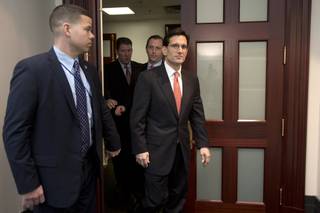Monday, Dec. 31, 2012 | 1:39 p.m.
House Republican leaders announced Monday afternoon that they would not wait around through New Year’s Eve to hold a vote on a budding deal to avert the "fiscal cliff," guaranteeing the country will go over it.
But it may not be that hard a fall – at least not right away.
At midnight, tax rates are scheduled to rise at all income levels back to 1990s levels, and across-the-board cuts to government spending are scheduled to take effect. Together, they are expected to deliver a $600 billion gut punch to the economy.
Congress set itself the Jan. 1 deadline to reach a deal to avert those tax increases and spending cuts.
But it will likely take several weeks to several months before higher tax rates start to be reflected in workers’ paychecks, and the effect of government cuts are felt throughout the economy. That delayed reaction may buy Congress a few more days to strike a longer-term deal to extend tax rates for at least the middle class at pre-cliff levels. The more elusive deal is what to do with the automatic spending cuts.
For months, lawmakers of both parties have been warning that going over the fiscal cliff would have dire consequences for the economy and potentially pitch the country into a second recession.
But for almost as long, efforts to reach a deal to avert the fiscal cliff failed to make any headway.
Over the weekend, Senate leaders Harry Reid and Mitch McConnell picked up the reins from President Barack Obama and House Speaker John Boehner, pledging to strike a deal that would prevent the combination of tax hikes and spending cuts.
In the last 24 hours, it was McConnell and Vice President Joe Biden who came, in McConnell’s words, “very very close” to striking a deal.
The deal, as it is emerging, would extend current income tax rates up to $400,000 in income, or $450,000 for couples. But there is no agreement yet, according to McConnell’s aides, on whether or how long they should delay sequestration cuts from taking effect. Though lawmakers have been warning most vocally that the tax hike would be felt in workers’ paychecks, sequestration cuts, by most economists’ calculations, are expected to deliver the harsher blow to the economy.
Democrats had been going for a deal that would have allowed tax rates above $250,000 to rise, while Republicans wanted a deal that would not let taxes rise at any income level.
The deal, such as it is – and it is not finalized – would require both sides to make concessions. Earlier on Monday, Reid indicated that there were still key issues that divided the two sides, though he expressed hope that lawmakers would be able to strike a deal and vote on it before the midnight deadline.
But as of 4:30 p.m., Reid had not yet voiced his opinion on the budding deal, much less scheduled it for a vote on the Senate floor.
The House has said since before Christmas that it would wait to act until the Senate had first planned its course of action.
Now with the House pledging that it will not vote until tomorrow, the country is guaranteed to miss the Jan. 1 deadline, no matter what the Senate does.


Join the Discussion:
Check this out for a full explanation of our conversion to the LiveFyre commenting system and instructions on how to sign up for an account.
Full comments policy